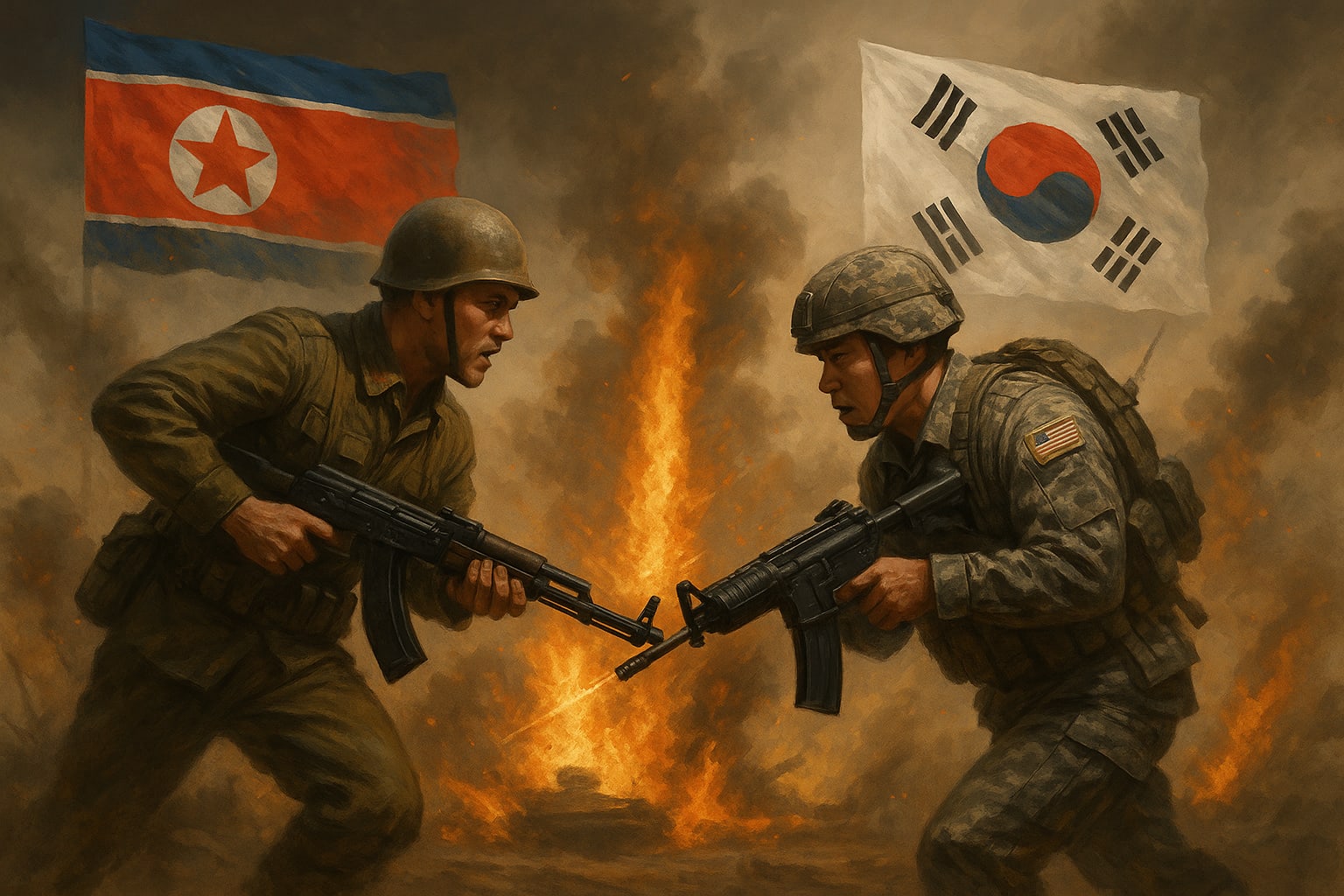In a world where peace often balances on a knife’s edge, one of the most chilling scenarios imaginable is a full-scale military attack by North Korea on South Korea. 🌏 While tensions on the Korean Peninsula have simmered for decades, a direct conflict would not just be a regional disaster—it could become a global catastrophe.
So, what would actually happen if North Korea launched a sudden attack on its southern neighbor? This article explores this high-stakes question in depth—from political alliances to nuclear threats, civilian casualties, and long-term global consequences.
—
🇰🇷 A Fragile Peace Since 1953
Though the Korean War ended in 1953 with an armistice, no official peace treaty was signed. Technically, North and South Korea remain at war. Over the years, there have been numerous provocations: missile tests, cyberattacks, naval skirmishes, and dramatic diplomatic twists. Yet, full-scale war has been avoided.
The reason? Mutual destruction.
—
🔥 Scenario: North Korea Launches a Surprise Attack
Let’s imagine the worst-case scenario: North Korea launches a sudden, unprovoked military attack across the Demilitarized Zone (DMZ). Here’s what could happen:
—
1. 💣 Instant Retaliation from South Korea and the U.S.
South Korea is one of the most technologically advanced militaries in the world. It has robust missile defense systems, advanced jets, and strategic coordination with the United States, which has 28,500 troops stationed on Korean soil.
Under the U.S.–South Korea mutual defense treaty, the U.S. would be obligated to respond militarily. A joint counterattack would likely involve:
Precision airstrikes on North Korean military facilities
Naval blockades
Cyber warfare
Electronic jamming and satellite disruption
However, this retaliation would come after significant early damage, particularly to Seoul—a city of over 10 million people, located just 35 miles from the North Korean border.
—
2. ☢️ The Nuclear Wildcard
North Korea has developed an estimated 30 to 60 nuclear warheads, and although the reliability of their delivery systems is debated, even one successful nuclear strike could be devastating.
If North Korea feels cornered, it might resort to:
Tactical nuclear strikes against military targets
Launching missiles at Tokyo, Guam, or even Hawaii
Using nuclear weapons as a bargaining chip to halt international retaliation
In response, the United States might consider a nuclear counter-strike, risking a nuclear war not seen since World War II. 😱
—
3. 👥 Civilian Catastrophe and Refugee Crisis
The human toll of such a conflict would be unimaginable:
Millions of civilians in Seoul would be at immediate risk
Refugee flows into China and Japan could overwhelm resources
Essential infrastructure—hospitals, power grids, water systems—could be destroyed in days
NGOs and the UN would struggle to provide aid in a war zone filled with chemical, biological, or nuclear hazards.
—
4. 🌐 Global Economic Shockwaves
The Korean Peninsula is home to major tech and manufacturing hubs, including Samsung, Hyundai, and LG. A war would cause:
Disruption in global supply chains
Crash in Asian and global stock markets 📉
Rising oil and commodity prices
Investor panic and currency fluctuations
If you think COVID-19 shocked the global economy, a Korean war could be much worse in economic terms.
—
5. 🕊️ China and Russia: Wildcards in the Conflict
China is North Korea’s biggest trade partner and has long used it as a buffer zone against U.S. influence. However, a full war could force China into a tight spot:
Support North Korea and face Western sanctions
Abandon North Korea and risk regime collapse, causing chaos at its own border
Russia, too, may intervene diplomatically or militarily, especially if NATO becomes involved. This could drag the conflict into a proxy war resembling Syria—but with far higher stakes.
—
🧠 Would Kim Jong-un Really Do It?
Kim Jong-un knows that an all-out war would likely mean the end of his regime. While he uses aggressive rhetoric and military shows of force for internal control and international leverage, a suicidal war is unlikely—but not impossible.
Analysts worry most about:
Miscommunication during military drills
Unintended escalation after a border skirmish
A desperate move if Kim’s regime feels cornered by sanctions or internal unrest
—
✅ Conclusion: The World Cannot Afford This War
The possibility of a North Korean attack on South Korea is terrifying because the consequences would spiral beyond the control of any one nation. The death toll, economic collapse, refugee crises, and nuclear threats would not only affect Korea, but the entire planet. 🌍
That’s why continued diplomacy, military deterrence, and global cooperation are essential. Every provocation must be handled with care, because the cost of failure is simply too high.
—
💬 Final Thought
North Korea attacking South Korea isn’t just a “what-if” question for defense analysts—it’s a real-world possibility with consequences that would ripple through generations. Let’s hope such a day never comes. But if it does, the world must be prepared—because there will be no second chance. 🙏
